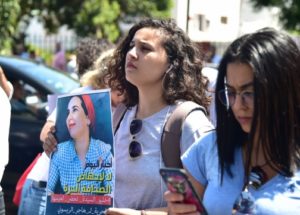


Humanists International at the United Nations has castigated states such as Iran, Morocco and Saudi Arabia for their treatment of women human rights defenders and dissidents.
In a statement made at the 42nd session of the UN Human Rights Council in Geneva, Humanists International’s Director of Advocacy, Elizabeth O’Casey, raised the cases of three women, who in recent weeks have suffered from their governments attempts to silence them.

Solidarity with Hajar Raysouni outside court (alyaoum24)
The statement was covered by two Morrocan news sites, Alaoual and Alyaoum 24, where Hajar Raissouni was previously a journalist.
O’Casey highlighted the cases of:
O’Casey said, “Whether it is to penalise and publicly shame a woman for having premarital sex and an alleged abortion, to legally intimidate and discriminate against a woman so severely she sets herself on fire, or to imprison and torture a woman who has campaigned for the basic right to live her life independently, these cases demonstrate what happens when governments want to silence female dissidents, whose bravery and critical minds intimidate.”
She called on the Human Rights Council to step up its action in the protection and defense of women human rights defenders.
The statement follows in full below:
42nd Session of the UN Human Rights Council (9th – 27th September 2019)
General Debate Item 4
Elizabeth O’CaseyJust over a week ago, Sahar Khodayari died in a Tehran hospital after setting herself on fire outside court. She had been detained after trying to enter a football stadium dressed as a man last year.
At the beginning of this month, Moroccan journalist and sometime-critic of the government, Hajar Raissouni, was charged with having an abortion and sex outside marriage. She faces up to two years in prison if convicted.
In Saudi Arabia, the family of Loujain al-Hathloul, a prominent advocate of women’s right to drive and outspoken critic of guardianship laws, says she remains in prison after turning down a deal to deny being tortured and sexually assaulted whilst detained in exchange for her freedom.
These are just three of countless cases of women across the world who fight to highlight the human rights abuses and gender-based discrimination entrenched in the law and practice of their countries.
Whether it is to penalise and publicly shame a woman for having premarital sex and an alleged abortion, to legally intimidate and discriminate against a woman so severely she sets herself on fire, or to imprison and torture a woman who has campaigned for the basic right to live her life independently, these cases demonstrate what happens when governments want to silence female dissidents, whose bravery and critical minds intimidate.
The UN Special Rapporteur on Cultural Rights has observed that, “We face a multidirectional global avalanche of misogyny, to which we must have an urgent global feminist riposte.”
We ask: When will the international community match the integrity and courage of these women human rights defenders by supporting their actions, ensuring their protection, and coming up with that riposte so urgently needed?